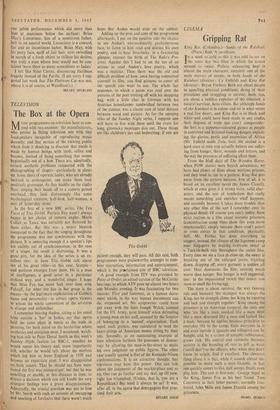TELEVISION
The Box at the Opera
Music programmes on television have to con- tend with two enemies: the manufacturers, who persist in fitting television sets with tiny loudspeakers incapable of reproducing music decently; and that section of the viewing public which finds it shocking to discover that music is made by human beings with teeth, saliva and bosoms, instead of being something that comes hygienically out of a box. There are, admittedly, certain aesthetic problems connected with the photographing of singers—particularly in close- up. Some shots of operatic ladies, who are already inclined to embonpoint, can make them look Positively grotesque. As they huddle on the studio floor, singing their heads off to a camera poised overhead, they look distressingly like some mythological creature, half-bird, half-woman, a sort of latter-day siren.
In the first of a new BBC series, The Ten Faces of Tito Gobbi, Patricia Foy wasn't always happy in her choice of camera angles. Marie Collier as Tosca was certainly not flattered by them either. But this was a minor blemish compared to the fact that the singing throughout the programme was not synchronous with the picture. It is annoying enough if a speaker's lips are visibily out of synchronisation; in the case of a singer, the result is distressing. It was a great pity, for the idea of the series is an ex- cellent one: to have Tito Gobbi talk about .ten of his great roles—in this case, Scarpia-- and perform excerpts from them. He is a man of intelligence, a good actor in a particular stylised way, and a wonderful singer. I hope that Miss Foy has more luck next time with Falstaff, for what she has in her grasp is the means—by the legitimate exploitation of Gobbi's name and personality—to attract opera viewers to whom the whole convention of the art-farm is strange and unfamiliar.
I remember hearing Auden, sitting at his usual table outside a `bar' in- Ischia, say that opera held the same place in music as the nude in Painting, for both stood on the borderline where aesthetics and eroticism meet. I wondered, watch- ing him talk to Peter Duval Smith in this week's Sunday Night feature on BBC-1, whether he Would repeat his theory and, more importantly still, whether he would talk about the motives Which -led him to leave England in 1939 and become an expatriate poet. I was disappointed on both counts. That he should not have men- tioned the first was unimportant; but that he was unwilling or unable, at this distance in time, to discuss a decision which can still kindle the very strongest feelings was a grave disappointment. Admittedly, the crucial question was put to him by Mr. Smith with such an amount of uncapping and touching of forelocks that there wasn't much hope that Auden would utter on the subject.
Adding up the pros and cons of the programme afterwards, I put on the positive side the chance to see Auden's extraordinarily pachydermous face, to listen to him read and discuss his own poetry, and to hear Stravinsky, in a fascinating glimpse, recount the birth of The Rake's Pro- gress. Against this I had to set the use of an actress to read Auden's love poetry, which was a mistake. Then there was the old and difficult problem of how, once having committed yourself to film, you find pictures to cover all the speech you want to use. The whole last sequence, in which a poem was read over the pictures of the poet trotting off with his shopping bag, with a little chat in German with his Austrian housekeeper sandwiched between two of the stanzas, was a classic case of total divorce between word and picture. As for the opening titles of the Sunday Night series, I suppose one will have to live with them until the craze for long, gimmicky montages dies out. These things are like children's tics and bedwetting; if you are Tito Gobbi patient enough, they will pass. All this said, both programmes were praiseworthy attempts to com- bine instruction, information and entertainment, which is the proclaimed aim of BBC television.
A good example from ITV was provided by Point of Order, an edited version of the McCarthy hearings, to which ATV gave up almost two hours one Monday evening. It was fascinating for two reasons. First and foremost, as a human docu- ment which, in the way human documents can do, surpassed art. No scriptwriter could have got away with the lines Joseph Welch, counsel for the US Army, gave himself when defending a young man on his staff, accused by the Senator of belonging to a 'named' organisation. Each word, each gesture, was calculated to rend the heart-strings of American mums sitting by their sets. Secondly, as art outstanding example of how television furthers the processes of democ- racy by allowing the man-in-the-street to make his own judgment on public figures. The other case usually quoted is that of the Kennedy-Nixon confrontations. It is an attractive thought that television may have this power. One can talk about the judgments of the market-place and so on. One can go further and say that, up till now, right has triumphed. (Unless, that is, you are a Republican.)' But need it always be so? It was, after all, in the agora that demagogues first prac- tised their arts.
STUART HOOD






































 Previous page
Previous page